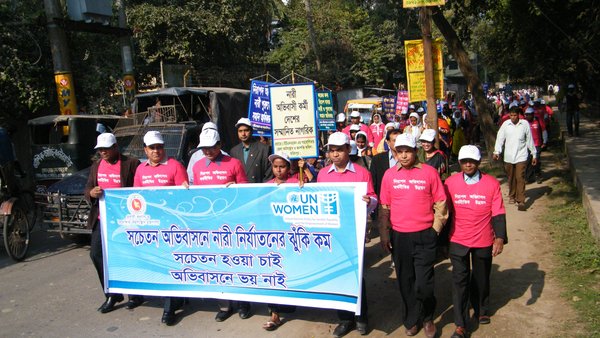
Photo by Global Residence Index on Unsplash.
Migrants’ economic contribution in both countries of origin and destination cannot be understated. In 2022, migrant remittances totalled almost $800 billion contributing a significant proportion of the capital inflow of mainly developing countries. Even though remittances are sent to individuals, they also have a positive impact on a country’s Gross Domestic Product. Remittances are therefore considered vital in helping many out of poverty as well as contributing to at least seven of the seventeen Sustainable Development Goals (SDGs). There is a great push internationally, for and by states to ‘promote faster, safer and cheaper transfer of remittances and foster financial inclusion of migrants.’
As the push to optimise the economic benefits of migration gains traction, the same cannot be said of states’ efforts to ensure migrants’ well-being in host countries, particularly migrants’ access to justice. A good example is the comparatively low state ratifications of the Convention of the Rights of Migrant Workers and Members of the Families, particularly by major destination countries. Despite some ongoing international initiatives, such as the Colombo Process through which states in South and South East Asia seek to improve welfare and protection measures for temporary labour migrants, access to justice for migrants remains a challenge.
Protecting and assisting justice-seeking migrants: the role of diplomatic missions
Migrants usually face a multitude of justice-related problems, whether or not their status is regular. Of course, migrants in an irregular situation have additional vulnerabilities and are often subject to exploitation, trafficking, acts akin to slavery and other forms of human rights violations both from state and non-state actors. The human rights violations migrants suffer are well-documented and yet many of them may remain unredressed. Barriers to migrants’ access to justice can be institutional, cultural, linguistic, structural, legal, economic, political etc.
Under international law, a state is obliged to protect and respect the human rights of all persons in its territorial jurisdiction, regardless of nationality. Therefore, migrants should be able to access justice for wrongs suffered in the country of origin, transit, or destination. However, many migrants for various reasons are unable to access justice, not only in their home country but also in countries other than their own. Trying to remedy transnational injustices is particularly difficult for an individual without the backing of the state or assistance from transnational non-state actors. For this reason, the consular functions of a state’s diplomatic mission are of vital importance for migrants.
Under the international law on diplomatic and consular relations, one of the functions of a diplomatic mission (an embassy, high commission or consulate) is to protect ‘in the receiving state the interests of the receiving state and of its nationals, within the limits of international law.’ Accordingly states usually encourage their citizens to get in touch or even register with their diplomatic missions once in a foreign country. When they need legal assistance or get into difficulty abroad, nationals of the sending state may request the assistance of their diplomatic mission to act as a medium or mediator for justice.
Diplomatic missions act as mediums for justice when executing the function of issuing important documents including IDs, passports, and travel documents to nationals. Lack of documentation excludes people from the opportunities that the law provides thus exposing them ‘to abuse and exploitation’ as well as creating an obstacle for them to access other basic services such as health care, education and even seeking justice when their rights are violated. For migrants, lack of identification documents may result into arrest, detention, and perhaps, deportation on grounds of illegal presence in the host country.
Migrants may often require documents from their embassies in cases where the ones they had are expired, lost, destroyed, or confiscated by the employer or employment agency for the duration of migrant worker’s employment. Those that leave their employment before it runs its course, mainly due to exploitative conditions, find themselves in a situation of illegality due to lack of documents. In such a case, the diplomatic mission once apprised of the migrant worker’s plight should assist them to replace or recover their documents. Where requested, the diplomatic mission can also provide relevant travel documents in a timely and effective manner.
As mediators for justice for nationals of the sending state, diplomatic missions should be able to assist them to seek or obtain redress for the wrongs that they suffer in the host state. This might involve providing legal advice, making referrals to appropriate institutions in the host state including legal service providers and other remedial institutions such as ombudsmen or negotiating with host states for better treatment and terms for their nationals. Some diplomatic missions in specific host states have also taken on the role of mediator between migrant workers and employers, usually for unpaid salaries.
The Vienna Convention on Consular Relations (article 36) specifically obliges free communication between consular officers and their nationals. Consular officers are obliged to visit and communicate with a national who is in prison or detention and to arrange for his or her legal representation if the arrested person so requests. Hence the arresting authority is equally obliged to inform the migrant of their right to consular assistance. Failure for host states to respect the right of consular protection and assistance may lead to diplomatic stand-offs such as a state declaring a moratorium on labour export to a specific state.
The access to justice deficit
Sometimes migrants in need of consular assistance experience difficulty in accessing their diplomatic mission. This could be due to lack of awareness of the diplomatic mission or its role, geographically distant diplomatic missions, and in some cases, staff at the mission may require those who approach it to present their passports or prove their identity before they can be assisted (even though it is for that very reason one is approaching the mission).
Reports on migrant workers access to justice reveal that embassies and consulates are constrained by various reasons to provide any effective assistance to migrants seeking justice. Diplomatic missions of many sending countries are usually under-resourced and under-staffed. They lack the capacity to deal with the myriad of problems specifically regarding migrant workers. Additionally, the consular staff may lack training on labour issues and therefore may not be so helpful. Due to limited resources, some missions fail to deploy labour attachés in major destination countries. Consular staff may also be challenged by the host country’s legal system, language, and bureaucracy. Some diplomatic missions may claim to lack a clear legislative mandate to assist migrant workers pursue justice, while some consider that their primary function is to maintain strong economic, trade and political relations with the host state. They are therefore careful not to be seen by the host state as interfering in its domestic affairs, which may be the case when they assist migrants pursue justice.
Due to these reasons and more, migrants may continue to be vulnerable to abuses and violations that may never be redressed, even as states, both origin and destination, continue to rely on their labour and economic contributions.
Paying off some dividends: investing in more robust consular services
Whereas remittances may not directly go into government coffers, the value that governments increasingly attach to them should make them reconsider improving the welfare of migrants that generate these remittances. The capacity and ability to effectively assist migrants access justice in a host state varies between diplomatic missions and between countries. Despite this, the obligation to protect the rights of their nationals in host states should be upheld and vigorously pursued by sending states through their diplomatic missions.
In order to do so, countries should invest in better consular services to assist their citizens who require redress for wrongs suffered while in a foreign country. They should consider:
1) Establishing consular services in states where a significant number of their citizens live and work;
2) Resourcing diplomatic missions adequately to provide the requisite consular assistance, including having labour attachés, where necessary;
3) Providing comprehensive, up-to-date training to consular staff on their role and obligations (including training on a host country’s laws, international laws and rights of migrants);
4) Creating linkages with helpful organisations/institutions in the host countries;
5) Providing consular ID cards as an additional means of protection;
6) Negotiating better terms with host governments, and if necessary suspending labour migration arrangements;
7) Creating liaison units within the sending country’s department of foreign affairs to follow up on compensation claims by migrants or members of their families - mainly where the migrant dies or is incapacitated to follow up their claim.
Through enhanced consular services, states can demonstrate that they care for the welfare of migrants whose economic contribution they so value. They need to engage more with migrants in order to provide them a rights-based, people-centred service.



